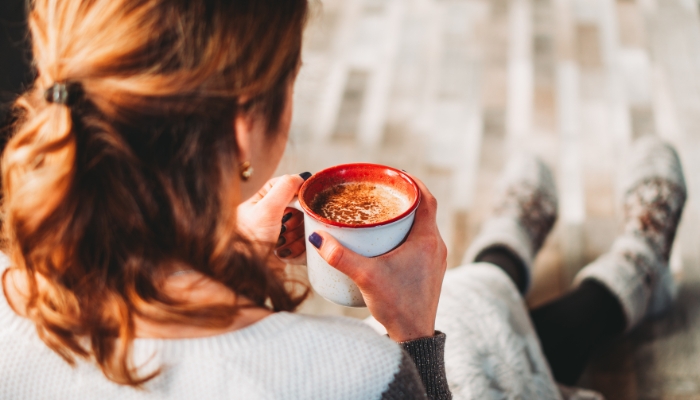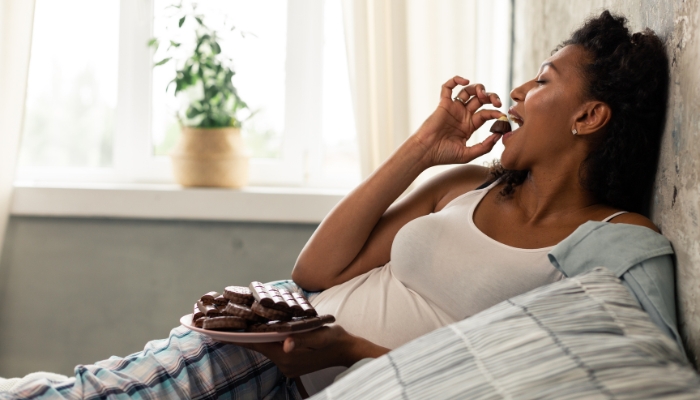We all have those nights where we crave a late-night snack or a comforting cup of tea before bed. But have you ever stopped to think about how that midnight munching might affect your sleep? While some foods can promote relaxation and better sleep, others can be sneaky sleep disruptors. In this guide, we'll dive into the foods and drinks you should reconsider before bedtime and why timing is crucial when it comes to eating and sleeping.

Caffeinated Beverages: The Sleep Thief
We all love that morning cup of joe. It's the kickstart many of us rely on to get our day going. But when it comes to winding down for the night, caffeine can be your worst enemy. Caffeine is a stimulant that blocks the action of a natural brain chemical called adenosine. Adenosine levels increase throughout the day, making us feel more and more drowsy and ready for a good night's sleep. When you drink a caffeinated beverage, it interferes with this process, keeping you alert and awake.
Now, you might be thinking, "I only drink coffee in the morning, so I'm good, right?" Not necessarily. The half-life of caffeine (the time it takes to eliminate half of the caffeine from your body) can range from 3 to 5 hours. This means if you have a coffee at 4 PM, by 9 PM, half of that caffeine might still be in your system. And for some people, even a small amount can affect sleep quality.
It's not just coffee, either. Many teas, sodas, and especially energy drinks can pack a caffeine punch. Even some medications and supplements contain caffeine. So, if you're having trouble sleeping once your head hits the pillow, it's worth looking at what you consume throughout the day.
Spicy Foods: A Hot Topic for Sleep
Spicy foods can add a kick to your meals, but they also kick your sleep quality down a notch. You're setting yourself up for potential discomfort when you indulge in that spicy curry or chili-laden tacos close to bedtime.
Eating spicy foods can raise your body temperature, which isn't ideal when trying to drift off. A cooler body temperature is conducive to sleep, and a sudden spike can disrupt this natural sleep-prep process.
Additionally, spicy foods can cause heartburn or indigestion for some people. Lying down after eating them can exacerbate this, making it uncomfortable to fall asleep.
Acidic Foods: The Silent Sleep Saboteurs
You might love that tangy kick from citrus fruits or the rich taste of tomato-based dishes, but these acidic foods could sabotage your sleep. Consuming them before bedtime can lead to acid reflux, where stomach acid flows back into the esophagus. The result? That uncomfortable burning sensation is known as heartburn. Lying down post-meal can exacerbate this, making it harder to drift off to dreamland. If you've ever tried sleeping with heartburn, you know it's no fun. So, for a more restful night, consider enjoying these foods earlier in the day or in moderation.

Sugar Overload: The Sweet Barrier to Sleep
We all love a sweet treat now and then, but indulging too close to bedtime might leave you tossing and turning on your mattress. High sugar intake can give you a quick energy boost, which is the last thing you want when trying to wind down.
When you consume a lot of sugar, your blood sugar levels spike. This can lead to a burst of energy, making it harder to fall asleep. And once the sugar high wears off, you might experience a crash, causing you to wake up in the middle of the night. For a peaceful night's rest, limiting sugary snacks and desserts before bed is best.
Alcohol: The Deceptive Sleep Disruptor
It's a common misconception that a nightcap can help you drift off. While alcohol might make you feel drowsy initially, it can seriously mess with your sleep cycle later in the evening.
Alcohol reduces the amount of REM sleep you get; REM is the deep, restorative sleep your body needs to feel refreshed. This means you might wake up feeling groggy, even if you've been in bed for a full 8 hours.
Plus, alcohol can lead to more bathroom trips throughout the night – and we all know that's the last thing contributing to a restful night!
Heavy Foods: Weighing Down Your Sleep
We've all been there: indulging in a late-night feast, only to find ourselves tossing and turning hours later. While satisfying those late-night cravings with a hearty meal is tempting, heavy foods can be a real sleep stealer.
Digesting a big meal requires energy, so your body is hard at work when it should be winding down. Foods high in fat or protein take longer to digest, keeping your digestive system active. This can lead to discomfort, bloating, and even heartburn if you're prone to acid reflux, especially when lying down. So, while chowing down on a late-night meal of tater tots or a bowl of ice cream might be tempting before you hit the hay, these foods can cause heartburn or stomach discomfort – which keeps you tossing and turning.

Role of Timing: It's Not Just What, But When
Ever heard of the saying, "timing is everything"? Well, it's spot on when it comes to sleep and food. Eating a large meal or even a small, spicy snack right before bed can disrupt your sleep. Your body needs time to digest, and lying down immediately after eating can lead to discomfort and potential issues like acid reflux.
Finishing substantial meals at least 2-3 hours before hitting the sack is generally recommended. This gives your body ample time to process the food. If you're a late-night snacker, opt for something light and easy to digest. Remember, it's not just about avoiding certain foods but also being mindful of when you consume them. Adjusting your eating schedule can be a game-changer for your sleep quality.
Navigating the world of sleep-friendly foods can be challenging, especially with so many delicious temptations around. Prioritize your sleep health, make informed food choices, and you'll be dreaming sweetly in no time. But if you're still having trouble falling asleep, it might be worth looking at your mattress! And that's where we at Jim’s Appliance & Furniture come in. We're always here to help you find the best fit for you.